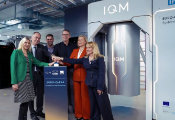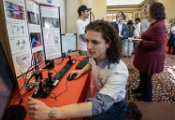Wave Photonics Secures £4.5M ($5.8M) to Enable the Widespread Deployment of Light-Based Chips
June 20, 2024 -- Wave Photonics, a Cambridge-based deep tech start-up, has received £4.5 million ($5.8 million US) to develop on-chip photonics designs for quantum technologies, sensors, and data centre applications. The UK Innovation & Science Seed Fund and Cambridge Enterprise Ventures led the round, with participation from Redstone QAI Quantum Fund, Kyra Ventures, Parkwalk’s University of Cambridge Enterprise Fund IX (UCEF IX), and Deep Tech Labs. The investment round was complemented by non-dilutive funding via EIC and Innovate UK grants, taking the company’s total funding to date to £5.4M ($6.9M).
Integrated photonics uses the same scalable process used to make semiconductor electronics chips to make circuits for light. It’s being used as the platform for energy-efficient communications, wearable healthcare sensors, rapid diagnostic tools, optical tensor processors, on-chip lidar, quantum computing and communication, and a host of other transformative technologies. However, in contrast with the mature semiconductor chip process, taking a photonic integrated circuit (PIC) from a concept to mass production is long and often prohibitively expensive.
Wave Photonics was founded in May 2021 by James Lee and Matthew Anderson, two Cambridge Quantum Photonics PhDs, and Mateusz Kubica (CTO), a former quantitative finance VP with 10 years’ experience in mathematical and computational modelling. Since its founding, the company has built and validated its core computational photonics design technology to reduce photonic product development time and aims to use it to unlock the transformative potential of integrated photonics. Their mission is to help unlock valuable photonics markets by reshaping the inefficient and fragmented productisation cycle into an integrated and rapid process, analogous to the development of modern semiconductors.
This investment will enable the company to take its technology from a research manufacturing line to a commercial foundry, with a particular focus on solutions for frontier applications such as quantum technologies and biosensing.




































